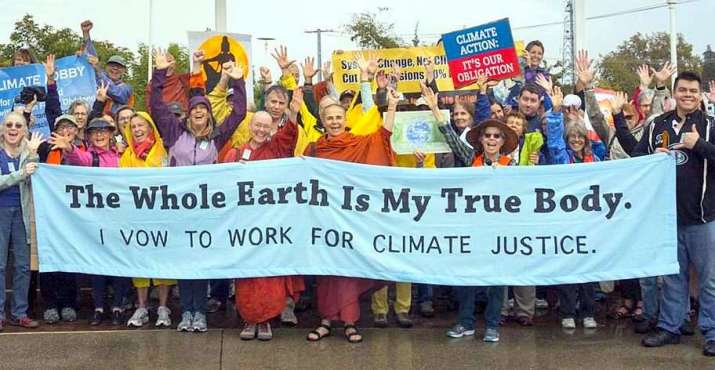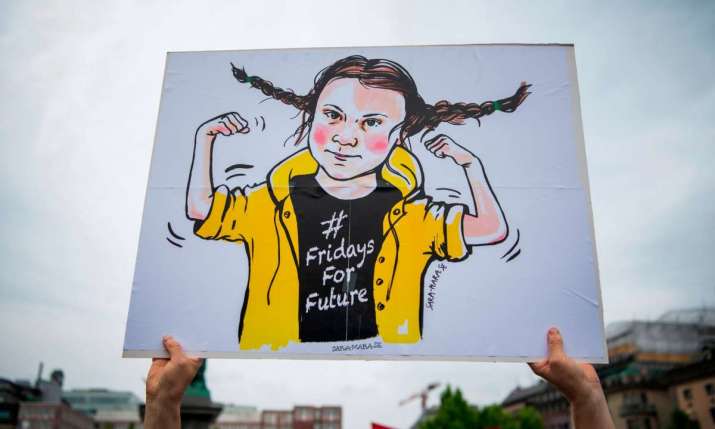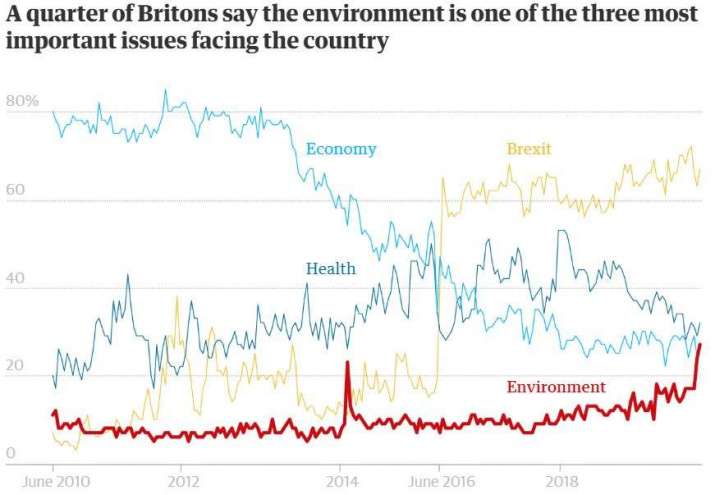FEATURES|THEMES|Commentary
Buddhistdoor View: The Climate Crisis and Our Collective Need to Wake Up
 From alokavihara.org
From alokavihara.orgLate last month, His Holiness the Dalai Lama offered praise and deep appreciation for 16-year-old climate activist Greta Thunberg. In a letter, he wrote: “It is very encouraging to see how you have inspired other young people to join you in speaking out. You are waking people up to the scientific consensus and the urgency to act on it.”
“I am also an ardent supporter of environmental protection,” the Dalai Lama continued. “We humans are the only species with the power to destroy the Earth as we know it. Yet, if we have the capacity to destroy the Earth, so, too, do we have the capacity to protect it.”
The Buddhist goal, in all of its many forms, is bodhi—to wake up. For many practitioners this translates as an individual quest, perhaps taking many lifetimes to eradicate the mindstream of its greed, aversion, and ignorance. Others seek rebirth in a Pure Land, where conditions all but ensure this outcome. Yet others overtly take one version of the bodhisattva vow or another, committing themselves to recognizing that while “beings are numberless, I vow to save them all.”
No matter which version of waking up a Buddhist subscribes to, along the way a certain loosening of the bounds of self should take place. This “self” is what we start with, wrapped up in an individualized identity. It is not a real thing to be abandoned or overcome. It is an illusion to be seen through.
With listening to teachings, developing trust (or faith, shraddha) and contemplation, and practicing mental cultivation, the individualized self diminishes. The circle of concern widens. In the commentary of the fifth century Indian Theravada scholar Buddhaghosa, The Path of Purification (Visuddhimagga), meditative cultivation of loving-kindness is even described in terms of breaking down barriers. In the eighth century, Shantideva, the great poet-philosopher of Nalanda, likewise wrote of our mistaken identities as being like different parts of one body. If there is a thorn in the foot, why would the hand not act to remove it? When there is suffering today in India, Sudan, Australia, or Syria, why do we, even from afar, not act in whatever way we can to remove it?
 A protester holds a drawing of Greta Thunberg. From theguardian.com
A protester holds a drawing of Greta Thunberg. From theguardian.comToday the most worrisome source of suffering is the climate itself. Earlier this month, alarm bells were sounded after scientists recorded carbon dioxide (CO2) levels at 414.7 parts per million (ppm), the highest measured level in human history. Scientists have made two points clear about this: the first that the principle cause is fossil fuel pollution, and the second is that past scientific models, sometimes decried as “fear mongering,” have in fact underestimated the pace of resulting climage change.
“It’s critically important to have these accurate, long-term measurements of CO2 in order to understand how quickly fossil fuel pollution is changing our climate,” said Pieter Tans, senior scientist with the Global Monitoring Division of the National Oceanic and Atmospheric Administration (NOAA). “These are measurements of the real atmosphere. They do not depend on any models, but they help us verify climate model projections, which if anything, have underestimated the rapid pace of climate change being observed.” (ScienceDaily)
More alarming stories tell us of the future Earth if we continue on this path: “Humans will perish in 31 years, warns latest climate change study,” reads a headline for Conde Nast Traveler, India. The article continues: “Cities like Mumbai, Florida, Shanghai will be reduced to swamps, 90 per cent of mankind will be annihilated, says report released ahead of World Environment Day.” (Conde Nast Traveler, India)
Also writing on World Environment Day, 5 June, Enrique Dans stated, “Today is World Environment Day, a few hours during which we should remember that whether it’s been officially declared or not, we are in the worst emergency that humanity has ever experienced and that the first step toward doing anything about an emergency is recognizing its existence.” (Forbes)
That is worth repeating: the worst emergency that humanity has ever experienced.
Recently the emergency has unleashed deadly heatwaves, such as those in Japan, which “could not have happened without human-induced global warming” according to a recent report. (The Meteorological Society of Japan) Perhaps more disturbing has been the link found between climate change and wars, as people driven to desperation through drought-induced hunger or other conditions have risen up against unconcerned governments. As The Economist published in May, noting in particular the wars in Syria and Sudan, while “It is never possible to pinpoint a specific war and say that it would not have happened in the absence of climate change. . . [nevertheless] climate change is causing environmental upheaval that destabilises regions and raises the risk of bloodshed.” (The Economist)
How are we to wake up to this reality?
In Europe, 16-year-old Swedish activist Greta Thunberg has captivated citizens. In the UK, she and the Extinction Rebellion movement have been credited with making the environment the third-most-pressing issue on the minds of the people. In recent EU elections, the Green Party saw record success. Jonathan Bartley, co-leader of the Green Party, said: “Nearly half of the young people of the UK are putting the environment among their top concerns, and no wonder. They can see governments making decisions about their future that take no account of our climate emergency.” (The Guardian)
 Guardian Graphic using data from YouGov. From guardian.com
Guardian Graphic using data from YouGov. From guardian.comIn the Buddhist world, many leaders have acknowledged an environmentalist agenda. But who among them has taken proactive measures of their own to help combat climate change? Who has spoken or acted on a scale matching the reality of this being humanity’s worst emergency ever?
Perhaps Bhutan. In fact, the Vajrayana Buddhist kingdom of Bhutan has garnered well-deserved praise for its range of environmental policies. For instance, it has promised to keep at least 60 per cent of its forest cover “in perpetuity,” and is planning to introduce heavy automobile taxes, public transit systems, and greater use of electric vehicles in the years to come.
“People are already noticing the temperature changes,” said Thinley Namgyel, Bhutan’s chief negotiator in the 2015 Paris climate summit. “High mountains, which should be closed for months, are now open year-round. Monsoon rains are not arriving on time, and then appearing when we don’t need them, destroying crops.” (The Guardian)
Actions like this are possible around the globe, but they take a political will that is currently lacking. So much of humanity is like the children in the Lotus Sutra, playing in a burning house, but too focused on the games to notice the surrounding flames. At what point will we be more like the father in the story who tells the children in the house that he has beautiful carts outside in order to skillfully convince them to put down their games and leave the burning house?
See more
Support for Greta Thunberg’s Speaking Out about the Climate Crisis (His Holiness the 14th Dalai Lama of Tibet)
Carbon dioxide levels in atmosphere hit record high in May: Monthly average surpassed 414 ppm at NOAA's Mauna Loa Observatory in Hawaii (ScienceDaily)
Humans will perish in 31 years, warns latest climate change study (Conde Nast Traveler India)
World Environment Day: This Is An Emergency, And We Have Run Out Of Options (Forbes)
The July 2018 high temperature event in Japan could not 2 have happened without human-induced global warming (The Meteorological Society of Japan)
How to think about global warming and war (The Economist)
Public concern over environment reaches record high in UK (The Guardian)
Bhutan has ‘most ambitious pledge’ at the Paris climate summit (The Guardian)
Related features from Buddhistdoor Global
Truth and Consequences: Capitalism, Climate Change, and the World We Created
Buddhistdoor View: Irreversible Climate Change—One Decade Left
A Call for Meditation in Action on Climate Change
Buddhistdoor View: Opportunity and Encouragement in the Midst of Trump’s Climate Change Skepticism
Fearlessness and Climate Change: A Better Way to Be in a Suffering World














